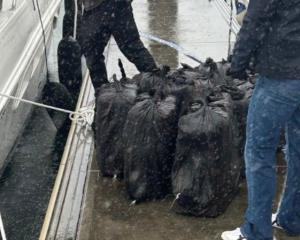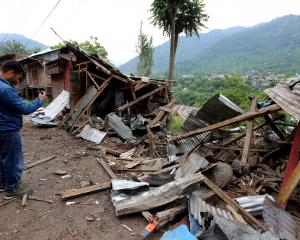
Kaing Guek Eav or 'Comrade Duch' was the first member of the Khmer Rouge leadership to face trial for his role within a regime blamed for at least 1.7 million deaths in the "killing fields" of Cambodia from 1975 to 1979.
Duch died at 12.52am on Tuesday (local time) at the Khmer Soviet Friendship Hospital in Phnom Penh, Khmer Rouge tribunal spokesman Neth Pheaktra said. He gave no details of the cause, but Duch had been ill in recent years.
In 2010, a United Nations tribunal found him guilty of mass murder, torture and crimes against humanity at Tuol Sleng prison, the former Phnom Penh high school which still stands as a memorial to the atrocities committed inside.
He was given a life sentence two years later after his appeal that he was just a junior official following orders was rejected. Duch - by the time of his trial a born-again Christian - expressed regret for his crimes.
Under Duch's leadership, detainees at Tuol Sleng prison, codenamed "S-21", were ordered to suppress cries of agony as Khmer Rouge guards, many of whom were teenagers, sought to extract confessions for non-existent crimes through torture.
The guards were instructed to "smash to bits" traitors and counter-revolutionaries. For the Khmer Rouge, that could mean anyone from school teachers to children, to pregnant women and "intellectuals" identified as such for wearing glasses.
Beneath Tuol Sleng's chaotic facade, Duch - himself a former maths teacher - had an obsessive eye for detail and kept his school-turned-jail meticulously organised.
"Nothing in the former schoolhouse took place without Duch's approval. His control was total," wrote photographer and author Nic Dunlop, who found Duch in 1999 hiding near the Thai border, two decades after the Khmer Rouge fell.
"Not until you walk through the empty corridors of Tuol Sleng does Stalin's idiom that one death is a tragedy - a million a statistic, take on a terrifying potency," Dunlop wrote in his account of Duch and his atrocities, "The Lost Executioner".
At S-21, new prisoners had their mugshots taken. Hundreds are now on display within its crumbling walls.
Norng Chan Phal, one of the few people to have survived S-21, was a boy when he and his parents were sent to Duch's prison and interrogated on suspicion of having links to the Khmer Rouge's mortal enemy, Vietnam.
His parents were tortured and killed but Chan Phal survived to give testimony at Duch's trial in 2010.
"He was cooperative, he spoke to the court frankly. He apologised to all S-21 victims and asked them to open their hearts. He apologised to me too," Chan Phal told Reuters.
"He apologised. But justice is not complete".
Comments
There are certain common factors, whenever a country descends into genocidal madness. First is the self loathing of one's own country and society. Then there is the blaming and shaming of those that are seen to have succeeded in that society, usually by a subset of the same group, that claim they are virtuous by pointing out the culprits. Then there is the lying, to condemn the targets. This usually starts with historical monuments and buildings, then moves to people.
The objective becomes to wipe the past, to start afresh, to create a virtuous society based on a narrow set of values. All the twentieth century atrocities that followed this path did so in the name of Marxism. Previous to that it was a multitude of religions or in Francies case, anti royalists that invented the guillotine only to have their own heads removed by it.
Internal revolutions are dangerous things. You can never be sure how things will play out nor the cost. Even fighting to create your own country doesn't always end well when you win.
The Cambodians didn't loathe their country; they loathed the Khmer. The Killing Fields is not an appropriate place to make Right leaning points.
Keep in mind America,
NZ and others recognised the regime of Pol Pot, as a bulwark against the Vietnamese commies.












